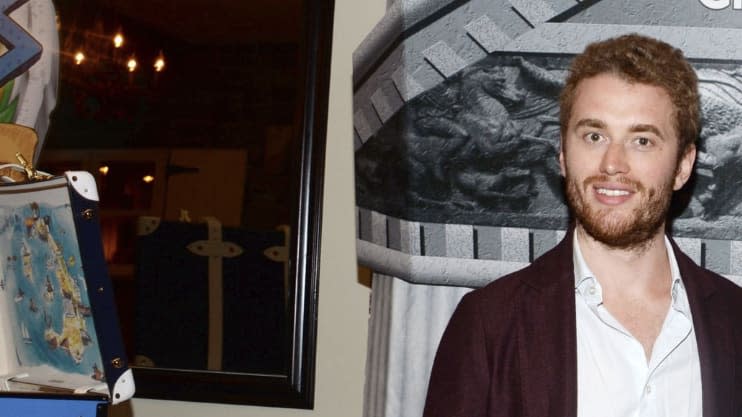Epic Art World Fraudster Gets 84 Months for $86M Scheme

He globetrotted on private planes, splashed out on $7,000 suits, and orchestrated million-dollar art deals that made him extravagantly wealthy. But it was all hinged on lies; the money—all $86 million—bilked from partners and confidantes in an elaborate ruse that was always doomed to fail.
On Monday, the former art world wunderkind Inigo Philbrick accepted his long-simmering fate: 84 months in prison followed by two years of supervised release. He had pleaded guilty to one count of wire fraud last fall.
Speaking before Judge Sidney Stein, the 34-year-old blamed his crimes on “vanity and greed.”
“I tried to find a way to live a life that wasn’t true,” he said.
According to a November press release announcing his guilty plea, which included $86 million of restitution, Philbrick “knowingly misrepresented the ownership of certain artworks, for example, by selling a total of more than 100 percent ownership in an artwork to multiple individuals and entities without their knowledge” and by taking out loans against pieces of art without informing co-owners.
In a pretrial sentencing memo last month, the government had requested that Philbrick face a prison sentence “substantially greater” than the roughly 22 months he had already spent behind bars. Still, they acknowledged he had cooperated with authorities and asked for a punishment below the sentencing guidelines of 121 to 151 months.
Disgraced Art Dealer Conned His Own Mentor With Fake Persona
Philbrick’s attorneys lobbied for a reduced sentence, citing what they described as a difficult childhood and long-running substance abuse issues.
According to their memo, as a teenager Philbrick discovered that his dad was having an affair with his secretary, a transgression that caused his parents to split. Philbrick, his mother, and his sister later lived for some time in a neighbor’s garage because of their financial insecurity, the lawyers said.
Prior to the divorce, the memorandum added, Philbrick had started smoking marijuana, and over time he expanded his palate to harder drugs like ecstasy, ketamine, and cocaine. Until just a few years ago, he also drank to the point of intoxication daily, the lawyers said. The overindulgence, they argued, was a requisite part of “how art deals are done.”
During Monday’s hearing, Judge Stein dismissed the notion that Philbrick’s sophisticated fraud was precipitated by his parents’ divorce. “That did not make him a criminal,” he said.
The judge also pushed back on the argument, made by Philbrick’s attorney Jeffrey Lichtman, that the high-profile nature of the case was itself a mitigating factor.
He was more receptive to arguments about Philbrick’s cooperation with the government. The defendant’s pre-sentencing memo noted that Philbrick had offered behind-the-scenes intelligence the feds hoped might lead to charges for other crimes; Lichtman suggested on Monday that Philbrick had even offered to risk his life in one instance.
The intel never panned out, but the meetings nevertheless required personal sacrifice, the attorneys claimed in the memo. Because of coronavirus restrictions, Philbrick had to quarantine after each meeting; during one of those cases his fiancé gave birth, and he was left “without access to a telephone or email.” He has still yet to meet his one-year-old daughter.
As she waited for an elevator after the sentencing, Philbrick’s fiancé, Victoria Baker-Harber, blamed part of his decimated reputation on “messed-up press.” She declined to answer additional questions from The Daily Beast.
Outside the courthouse, as a tabloid photographer clacked away, Lichtman called the outcome a “heavy sentence in comparison to other crimes,” though he acknowledged that there also “hasn’t been a crime with the amount of fraud that this one has.”
Philbrick had risen rapidly in the art world. After graduating from Goldsmiths, University of London, he interned at White Cube, a prestigious contemporary gallery in London founded by Jay Jopling.
Eventually, after taking on a more formal role at White Cube, Philbrick moved on to open a gallery of his own, reportedly using some capital from Jopling. In 2015, prosecutors later alleged, the wunderkind partnered with his mentor to help finance a $3.5 million deal for a 2009 Christopher Wool painting.
Philbrick allegedly claimed to Jopling that “he had sold” their stake in the piece to several investors, in addition to half of their stake in another item, though he didn’t forward any of the funds that should’ve come in.
Jopling pressed his protégé for answers. To buy himself time, the memo claimed, Philbrick “invented a fake name and fake email account” of a supposed South American investor named Martin Herrero, who relayed invented excuses for the delays.
Jopling, like other, similar victims of Philbrick, never got his money. He ended up $1.95 million in the hole, the memorandum said.
As his cons crescendoed, Philbrick absconded to the South Pacific nation of Vanuatu, where he played tennis and went by his real name. “He seemed very relaxed,” one local told The Daily Beast last year. “Philbrick and his girlfriend would come down by the beach to visit the Beach Bar for food and drinks. They also had a very cute puppy that would play with the other small local dogs.”
But in the summer of 2020, the island adventure came to an end. Authorities took him into custody in Vanuatu’s capital, Port Vila, while he was wearing his bathing suit.
On Monday, as Philbrick waited to learn his fate, he attempted to convey remorse for the entire debacle: “The only goal I have is to make the people who believed in me whole.”
Now, some of his victims will spend years trying to recoup their losses, fighting each other for whatever value remains among his assets, after Philbrick—their former partner or dealer or friend—handed them giant bags of hot air.
Get the Daily Beast's biggest scoops and scandals delivered right to your inbox. Sign up now.
Stay informed and gain unlimited access to the Daily Beast's unmatched reporting. Subscribe now.

 Yahoo Movies
Yahoo Movies 
